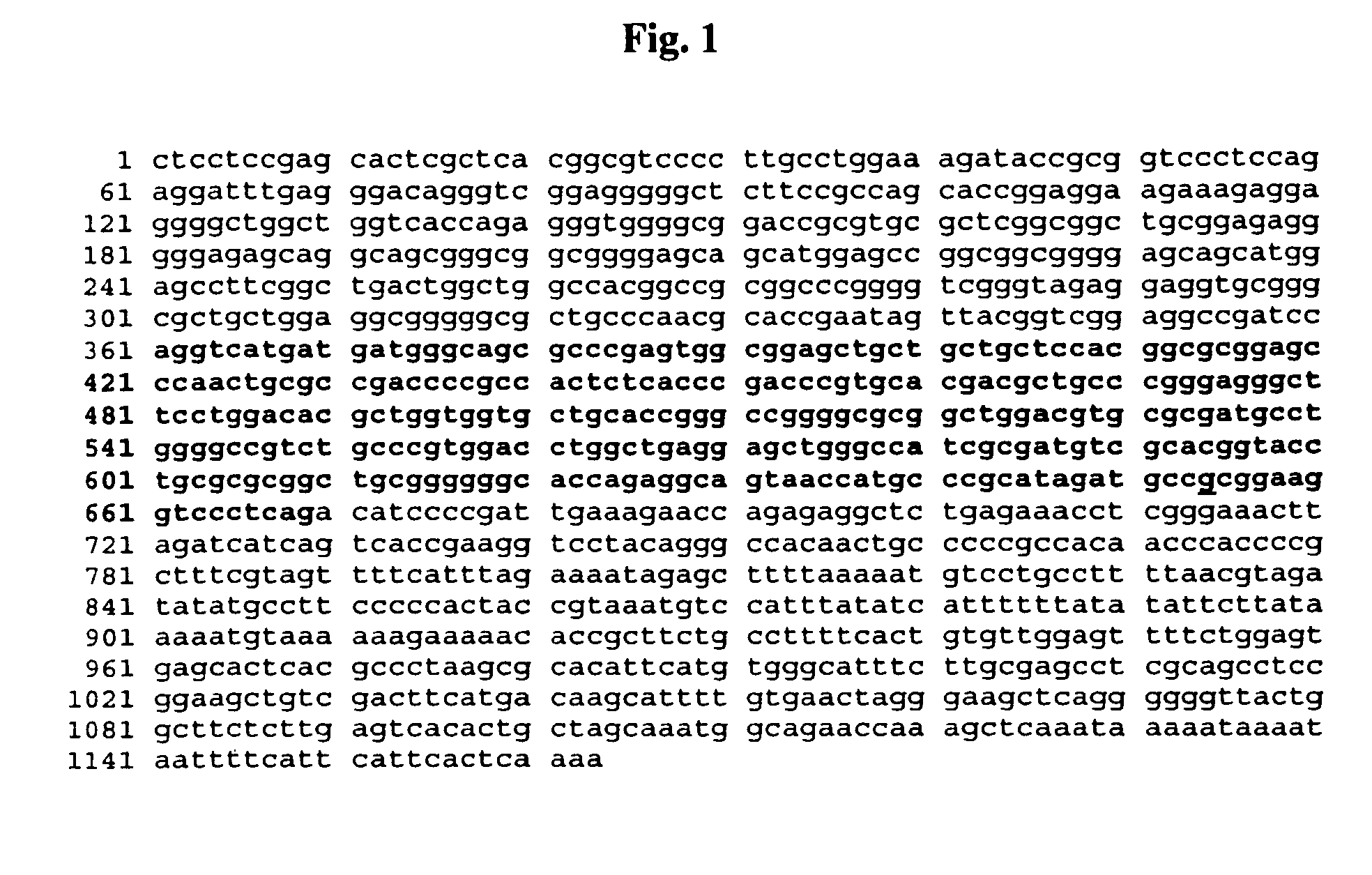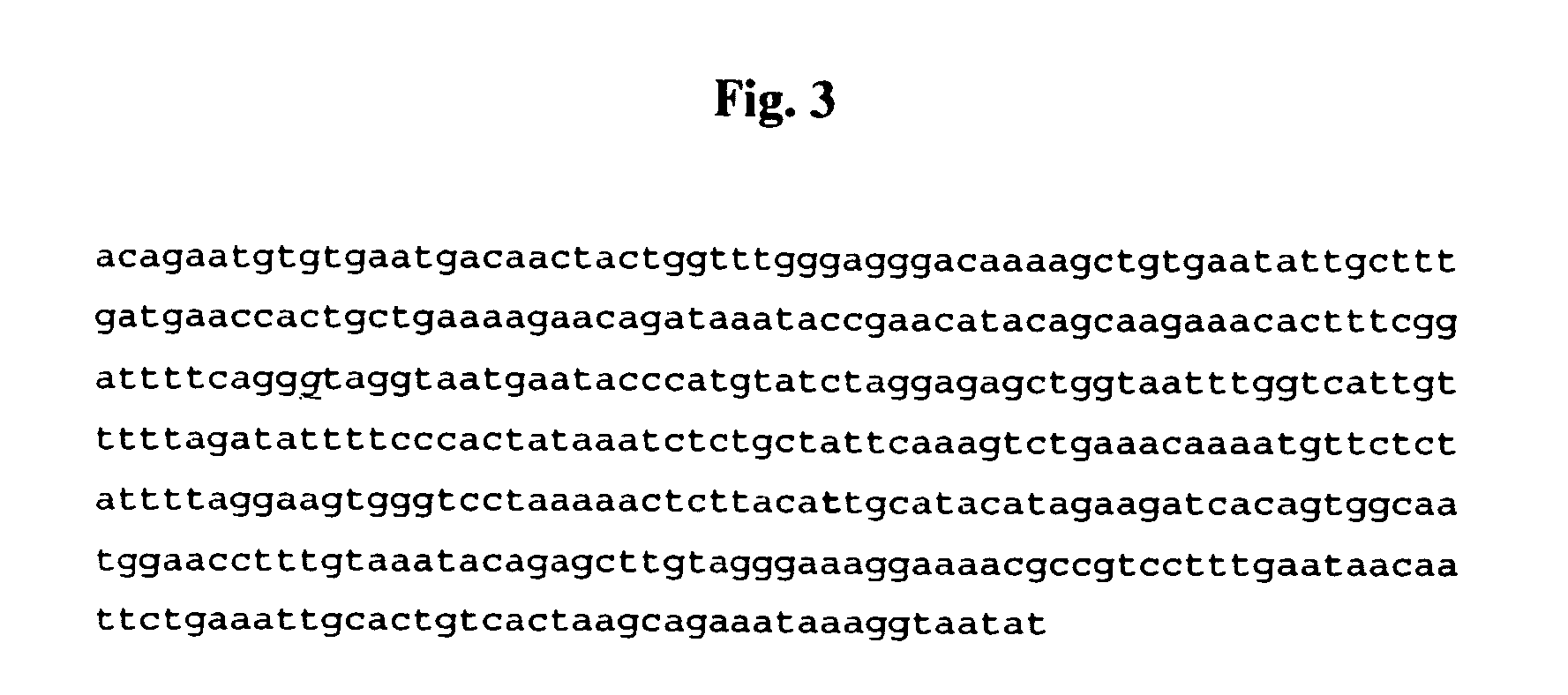Determining a predisposition to cancer
a predisposition and cancer technology, applied in the field of determining a predisposition to cancer, can solve the problems of premature protein truncation, undiscovered procedure, and very high risk of carriers of mutations in the above genes, and achieve the effect of increasing susceptibility
- Summary
- Abstract
- Description
- Claims
- Application Information
AI Technical Summary
Problems solved by technology
Method used
Image
Examples
example 1
[0060]The correlation between a germline alteration in the sequence of the NOD2 gene sequence and inherited predisposition to cancers of various sites, (inter alia cancers of the breast, colorectum, larynx, lung, ovary, stomach and thyroid gland) on example of analysis of 3020insC founder mutation in the NOD2 gene was calculated.
A.) Studies of Correlation Between NOD2 Germline Change 3020insC and Predisposition to Cancers of the Breast, Larynx, Lung, Ovary, Stomach and Thyroid Gland
Patients
[0061]Analyses have been performed in a group of 2604 invasive cancer cases of various sites collected mainly from four large hospitals in the Szczecin area (University Clinic Hospitals, Regional Oncology Hospital and Hospital for Lung Diseases) between 1999 and 2004. Study subjects were asked informed patient consent during outpatient clinic visits to the surgical and medical oncology clinics. In general, patient participation rates exceeded 90% for each cancer site. Patients were consecutive, ne...
example 2
[0108]The correlation between a germline alteration in the sequence of the CHEK2 gene sequence and inherited predisposition to cancers of various sites, inter alia prostate, breast, stomach, thyroid, colon and kidney cancers or myeloproliferative syndrome on example of analysis of IVS2+1G>A, 1100delC and I157T mutations in the CHEK2 gene was calculated.
A) Identification of CHEK2 Variants in the Polish Men with Prostate Cancer.
Patients
[0109]The case group for CHEK2 gene sequencing consisted of 96 men with sporadic prostate cancer and 44 men with familial prostate cancer (patients who had one or more first- or second-degree relative with prostate cancer) were diagnosed University Clinic in Szczecin.
Method
[0110]Genomic DNA isolation was performed as described above in Example 1.
Template PCR
[0111]The entire coding sequence of CHEK2 gene was amplified with pairs of primers and using annealing temperatures as follows (as described previously Dong et al. Am. J. Hum. Genet., 72: 270-80, 200...
example 3
Verification of the Correlation Between CHEK2 Variants and Predisposition to Cancers of Various Sites on a Larger Series of Cases and Controls than Presented in Example 3
Methods
[0139]The methods are described in Example 3.
Patients
[0140]To establish the range of cancer types associated with CHEK2 mutations, we genotyped 4008 cases of cancer and 4000 controls in Poland. We included seven of the ten most common types of cancer in Poland, and together these sites represent about two-third of all cancer cases in the country. Cases were collected from hospitals in Szczecin and surrounding counties. Study subjects were asked to participate at the time of diagnosis or during outpatient visits to the surgical and medical oncology clinics. In general, patient participation rates exceed 80% for each cancer site. Study subjects were unselected for age, sex and family history.
[0141]Three control groups were combined. The first group consisted of 2000 newborn children from ten hospitals throughou...
PUM
| Property | Measurement | Unit |
|---|---|---|
| Tm | aaaaa | aaaaa |
| Tm | aaaaa | aaaaa |
| Tm | aaaaa | aaaaa |
Abstract
Description
Claims
Application Information
 Login to View More
Login to View More - R&D
- Intellectual Property
- Life Sciences
- Materials
- Tech Scout
- Unparalleled Data Quality
- Higher Quality Content
- 60% Fewer Hallucinations
Browse by: Latest US Patents, China's latest patents, Technical Efficacy Thesaurus, Application Domain, Technology Topic, Popular Technical Reports.
© 2025 PatSnap. All rights reserved.Legal|Privacy policy|Modern Slavery Act Transparency Statement|Sitemap|About US| Contact US: help@patsnap.com



